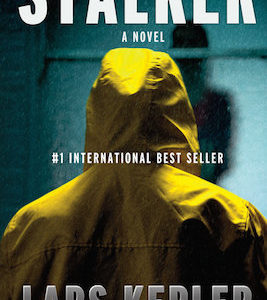Perhaps it’s so relatable because we’ve all been there: Going about our lives, minding our own business, when we stumble upon something that holds the power to knock us sideways. It might be as innocuous as an overheard conversation, as unsettling as an odd charge to a joint account, or as day-stopping as an accident on the road ahead. Either way, we’ve seen something we can’t unsee, heard something we can’t un-hear, learned something we wish we didn’t know.
Our friend doesn’t actually like us that much. Our husband wasn’t where he claimed to be. The suspect—though we weren’t his victim—knows what we saw.
We’re witnesses now. And the real story is just beginning.
When I posed this topic to an authors’ group recently, I was challenged: “Aren’t all witnesses unwitting?” Well, not so fast. True, the bestseller charts are full of characters who got more than they bargained for—A.J. Finn’s The Woman in the Window comes to mind, as does Paula Hawkins’ The Girl on the Train. But those narrators, however unreliable, were voyeuristic to start. An argument could be made that in looking for trouble, they managed to find it.
Compelling fiction—in the suspense genres especially—is full of people who’d already suspected something amiss (a neighbor who gave them the creeps, a colleague they’d never trusted), and followed the trail until they were in over their heads, even if it didn’t lead quite where they’d thought it would.
Contrast that with, say, Ruth Ware’s international hit The Woman in Cabin 10. Had the protagonist not chosen precisely the wrong door to knock on when she needed to borrow mascara, she would have remained oblivious to much of the plot—in spite of the fact that she was a journalist assigned to cover the details of the ill-fated cruise she was on.
In bestseller Kimberly Belle’s latest, Three Days Missing, a kidnapper takes the wrong child by mistake—and pulls a whole family of innocent bystanders into his target’s web. But who is truly innocent, and who knows more than they’re letting on? The mystery lies in figuring out the difference. In deft hands, we may not know until the final pages. Chris Bohjalian’s 2018 chart-topper, The Flight Attendant, begins when a party girl wakes up from a blackout to find a murder victim beside her. She sure feels like she’s an unwitting witness. But is she something worse?
In my own new novel, Forget You Know Me, two long-distance best friends who’ve grown apart are trying to reconnect over a video chat. It starts awkwardly, but with a little wine, things warm—until one of them leaves the room and the other sees, over her webcam, something she was never meant to see. Something no one was meant to see. But when she tries to intervene, to help, her friend all but gaslights her, provoking more questions than answers—and away we go.
Just as my own novels cross genres—suspense and women’s fiction—I’ve noticed these unwitting witnesses fall into two broad categories: Those who remain pulled into something against their will, and those who are either compelled or pushed to take matters into their own hands. Here are some recent releases that feature both—and some I’m looking forward to in the months ahead.
Not Her Daughter (Griffin) by Rea Frey
When a woman sees a child subjected to parental cruelty in an airport terminal, the vision stays with her—so when she sees the girl again, months later, she recognizes her right away. And this time, she plans to do something about it.
A Spark of Light (Ballantine Books) by Jodi Picoult
Is being in the wrong place at the wrong time the same as being an unwitting witness? As a mass shooting unfolds, the answer depends on which of Picoult’s heartbreakingly rendered point-of-view characters you ask.
The Au Pair (Berkley) by Emma Rous
A woman cleaning out her deceased father’s home stumbles upon a photo that calls a past tragedy into question—and only one person alive might hold the answers. Her childhood au pair, who must have seen more than she’s letting on.
True Places (Lake Union Publishing) by Sonja Yoerg
Suzanne Blakemore only meant to go for a drive. What she found was an injured, terrified girl who seems to have appeared out of nowhere—and neither of their lives will ever be the same.
Until the Day I Die (Lake Union Publishing) by Emily Carpenter (March 2019)
In the wake of her father’s untimely death, Shorie has gone away to college against her will. What she really wants is to continue helping to run the family business, so much so that she can’t resist doing a little off the clock work from her dorm, unbeknownst to the people who wanted her out of the way—and still do.
Daisy Jones & The Six (Ballantine Books) by Taylor Jenkins Reid (March 2019)
We’re about to learn what really drove the too-short rise and too-soon fall of an all-time-great rock band. But who is relaying this story? Why are the band members so open about their most intimate failures and triumphs? We don’t know—until the narrator corroborates a key part of the story that has never been told.
I’m Fine and Neither Are You (Lake Union Publishing) by Camille Pagan (April 2019)
Imagine finding your best friend dead—and being sworn to secrecy about what really happened to her.
Lock Every Door (Dutton) by Riley Sager (July 2019)
Suffice it to say Jules Larson has taken a job as an apartment sitter in the wrong building.
























